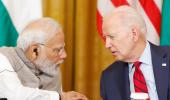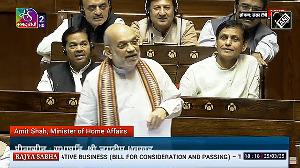'And if the United States, at that time, perceives India to have welched on the deal, not been our friend, when we did so much to make it a friend, that's trouble.'

For Dr Marshall M Bouton, president emeritus of the Chicago Council of Global Affairs, an international affairs think-tank with a special interest in the US-India relations, watching the White House eagerly roll out the red carpet for Prime Minister Narendra D Modi's State visit, was definitely history in the making.
He also mused to himself if it would be history America might regret.
Was it the 'real American dream about India'? Or could it crumble?
"The summary of the visit itself is a very clear signal: The US wants to get closer to India, especially in the security realm and it's willing to put aside India's buying tonnes of Russian oil, it's willing to put aside India's neutrality, Ukraine...", Dr Bouton tells Rediff.com's Vaihayasi Pande Daniel.
The second segment of a three-part Must Read interview:
- Part 1 of the Interview: 'How would America respond if China invades India?
Ukraine really didn't figure at all as an issue. Do you think that Ukraine could figure in the future, if this India-US relationship takes off further. Or maybe it's not a non-issue right now at this point?
It's not a non-issue. Of course.
No, I mean non-issue in the India-US relationship.
I think the US decided to put the Ukraine issue aside.
And that cannot be a problem later?
Oh, it could be a problem later.
On Capitol Hill, there's a large group of members of Congress, both Senators and representatives, who are now openly critical of India, and questioning whether we were wise to do as much for India, as they think we've done.
And they are saying, what's the deal here? We gave them a pass on the nuclear stuff. That was a big deal. We changed the Atomic Energy Act in order to do that. For Congress it is important.
The administration, they would not describe it, of course, as a non-issue, right.
They would first say that we have higher priorities in our relationship with India, that is to somehow convince India to become more of a partner, a more fulsome partner with us in Asia, without expecting that India is going to become an ally, not necessarily.
In public and political opinion, it's definitely not a non-issue.
Because, you remember, of course -- we all do -- that, back in the days of George W Bush, the mantra was, we want to be closer to India because, number one, we share interests and values. India is a democracy. We like democracies.
And in the context of Biden's framing his entire administration around the autocracy versus democracy, at a time when India is moving away from being a full democracy, hopefully not going to become an autocracy, but some people worry about that, including me. I think a lot of Indians do.
So, I think the Ukraine issue is not likely to become a major problem at this stage in the relationship.
But people have memories, you know, these members of Congress, remember that they worked very hard to get to the civil nuclear deal through.
And so, in general, what I'm saying, is there is a danger of disillusionment, down the road, if the two sides, number one, don't manage the relationship with understanding and communication.
And number two, depending upon whatever happened dependent upon events, most experts here, if we wind up in a conflict with China over Taiwan, sometime this decade or early next decade, which many people think is likely, where's India going stand? Where's India going to be?
And if the United States, at that time, perceives India to have welched on the deal, not been our friend, when we did so much to make it a friend, that's trouble.
The summary of the visit itself is a very clear signal: The US wants to get closer to India, especially in the security realm and it's willing to put aside India's buying tonnes of Russian oil, it's willing to put aside India's neutrality, Ukraine, but if it comes to the point where India does not support the US, when the US feels it really ought to be supported by India, then we've got trouble.

India and the US have once again come to a sort of very pregnant moment where there's so much to look forward to. That's a little deja vu. But also not so at all.
Yes, but it's not deja vu because the circumstances are very different.
For instance, a lot of people are comparing iCET, the agreement on political and emerging technologies that was signed earlier this year between (US National Security Advisor) Jake Sullivan and (National Security Advisor) Ajit Doval. They are comparing the two (the Modi visit and the civil nuclear deal intiated during then prime minister Dr Manmohan Singh's visit in July 2005) and they are saying for 15 years now people have been saying, 'What's the next big thing in India-US relations?'
 IMAGE: Dr Marshall M Bouton
IMAGE: Dr Marshall M BoutonAnd now people are saying, 'Oh, well, iCET is the next big thing' because this way the US is going to cooperate with India on all these technological issues and realms.
But you know, they are really very different. As Ashley (J Tellis, the Bombay-born Tata Chair for Strategic Affairs at the Carnegie Endowment for International Peace, the Washngton, DC-based think-tank) says there was a clear roadmap, in the case of the civil nuclear deal to get India off the bad boy list of nuclear nations.
And there was a clear way to do that, basically one issue.
Now, with this iCET, there are multiple issues.
If you look at the agreement (external link) again, there are 15 things we are going to do together. Where's the real focus going to be?
That may be more recognition of the state of the relationship, in which case there's more to do. That's quite possible.
But I'm not sure it represents the kind of clear landmark breakthrough that the civil nuclear deal was.
Feature Presentation: Aslam Hunani/Rediff.com











 © 2025
© 2025